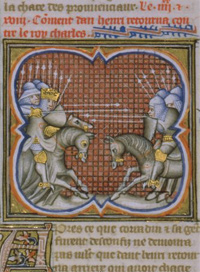
Charles I of Anjou (1126 - 1285): Decameron, II.6
Charles I, younger brother of Louis IX of France, played a key role in 13th-century politics, both in Italy and beyond. In 1267, he was appointed vicar general of Tuscany; he also became podest? (chief magistrate) of a solidly Guelph Florence, a position he would hold, though often in absentia, until 1280.
Florence, however, was only a small part of Charles' staggering realm of influence. Two French Popes, first Urban IV (1261-64), then Clement IV (1265-68) called upon the Angevin Charles as a champion of Guelph interests in Italy. Supported by the papacy, he became King of Naples and Sicily, defeating the Hohenstaufen Manfred in 1265 and Conradin in 1268, thus extinguishing that dynasty's claims to both the southern territories and the Imperial title. With the victory over Conradin at Tagliacozzo and the solidification of his alliance with Pope Clement IV, Charles effectively eliminated the Imperial threat in Italy. By placing his representatives in key positions in Central and Northern Italy, Charles secured a firm hold on the peninsula. Charles of Anjou changed the face of European politics and founded a dynasty whose predominance would last until the death of Robert of Naples in 1343.
Charles' later years were troubled by Sicilian rebellion, marked most prominently by the Sicilian Vespers uprising of 1282. The Sicilians, unhappy with heavy tax burdens and the moving of the capital to Naples, massacred the French garrison and offered the crown instead to Peter III of Aragon. After a few military campaigns in Calabria, Charles I died in 1285, bequeathing his kingdom to his son, Charles II.
The sixth tale of Day Two is set in Sicily during the period of Charles of Anjou's reign, around the time of the Sicilian Vespers. He appears as a central character in X.6 in which he overcomes base desires.
(R.P./N.S.) Adapted from Herde, Peter. s.v. Carlo I d'Angio. Vol. 20. Dizionario biografico degli italiani, Roma: Istituto della Enciclopedia italiana, 1960. pp. 199-226.; Enciclopedia dantesca, Vol. 1. Roma: Istituto della Enciclopedia italiana, 1970-78. pp. 834-836.